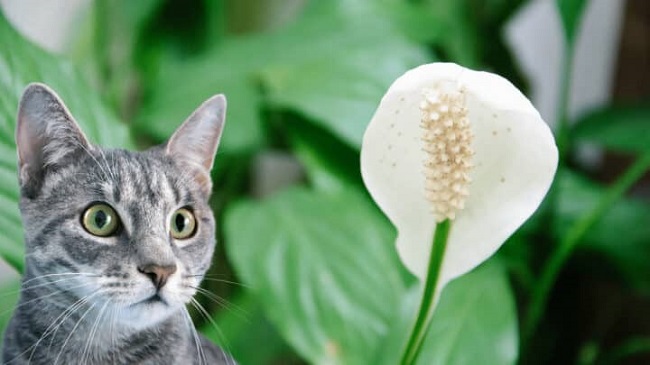Peace lilies are popular houseplants known for their elegant white flowers and glossy green leaves. If you’re a cat owner and considering adding a peace lily to your home, it’s important to understand whether these plants pose any risks to your feline friend.
In this guide, we’ll delve into the topic of peace lilies and cats, exploring their toxicity levels, potential dangers, symptoms of ingestion, and safety precautions to ensure the health and safety of your beloved pet.

Peace Lilies and Cat Toxicity: What You Need to Know
Here are some more information about it:
Read Also:
Understanding Peace Lilies
Peace lilies (Spathiphyllum spp.) are tropical plants native to the rainforests of Central and South America.
They are popular as indoor houseplants due to their lush foliage and graceful white flowers. While they are generally safe for humans, the same cannot be said for our feline companions.
Potential Toxicity to Cats
Unfortunately, peace lilies are considered toxic to cats. The plants contain calcium oxalate crystals, which can cause oral irritation, intense burning sensations, and other adverse effects when ingested by cats. It’s important to note that peace lilies can also be toxic to dogs and other pets.
Symptoms of Peace Lily Toxicity in Cats
If a cat ingests any part of a peace lily, they may exhibit the following symptoms:
Oral irritation: Cats may experience excessive drooling, pawing at the mouth, or increased sensitivity in the oral cavity.
Gastrointestinal upset: Ingesting peace lilies can lead to vomiting, diarrhea, and stomach discomfort in cats.
Difficulty swallowing: Swelling or irritation in the throat may cause cats to experience difficulty swallowing or gagging.
Safety Precautions for Cat Owners
To ensure the safety of your cat, it is recommended to take the following precautions:
- Keep peace lilies out of reach: Place peace lilies in areas where your cat cannot access them, such as high shelves or rooms that are off-limits to your pet.
- Consider alternative cat-friendly plants: Opt for non-toxic houseplants that are safe for cats, such as spider plants or Boston ferns, to beautify your home without posing risks to your feline friend.
- Monitor indoor plants: Regularly inspect your indoor plants to ensure that your cat has not nibbled on any leaves or flowers. If you suspect your cat has ingested part of a peace lily, contact your veterinarian immediately.
- Provide alternative stimulation: Cats are naturally curious and may be attracted to houseplants. Provide alternative forms of stimulation, such as interactive toys, scratching posts, and safe indoor environments, to divert their attention away from plants.
Seeking Veterinary Care
If you suspect that your cat has ingested any part of a peace lily or is exhibiting symptoms of toxicity, it’s essential to seek veterinary care promptly.
Your veterinarian will be able to evaluate your cat’s condition, provide appropriate treatment, and offer guidance on managing the situation.
Read Also:
Conclusion
In conclusion, peace lilies are toxic to cats due to the presence of calcium oxalate crystals. Ingesting peace lilies can cause oral irritation, gastrointestinal upset, and other discomforting symptoms in cats.
To ensure the safety of your feline friend, take precautions by keeping peace lilies out of reach, choosing cat-friendly houseplants, monitoring indoor plants, and providing alternative stimulation.
If you suspect your cat has ingested a peace lily or is showing signs of toxicity, seek veterinary care immediately. By being aware and taking necessary precautions, you can create a safe environment for your cat to thrive in.
























